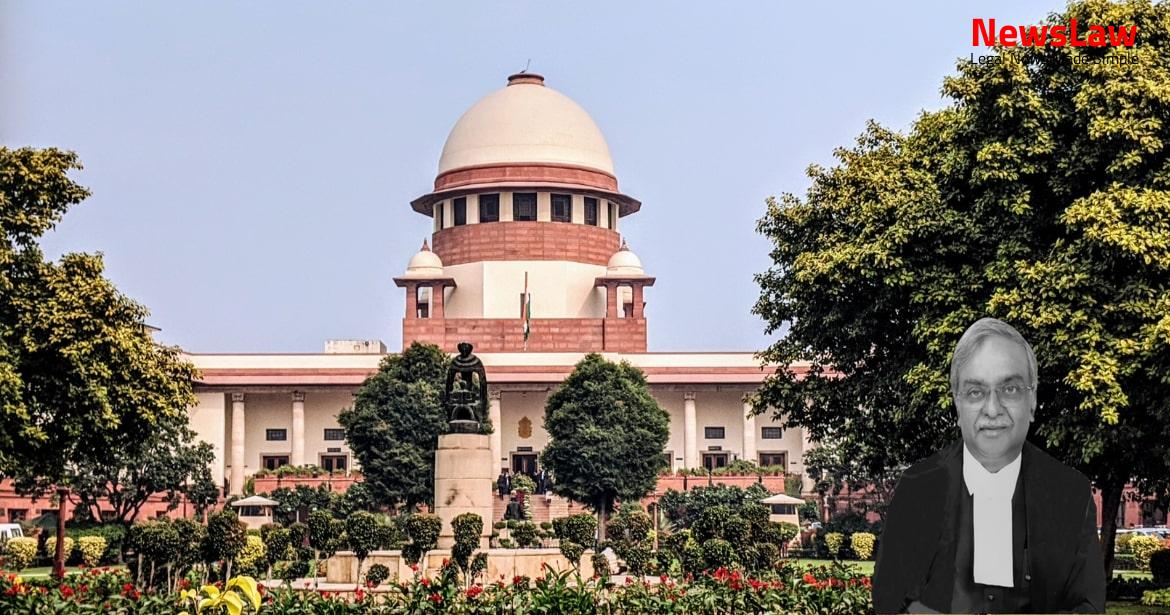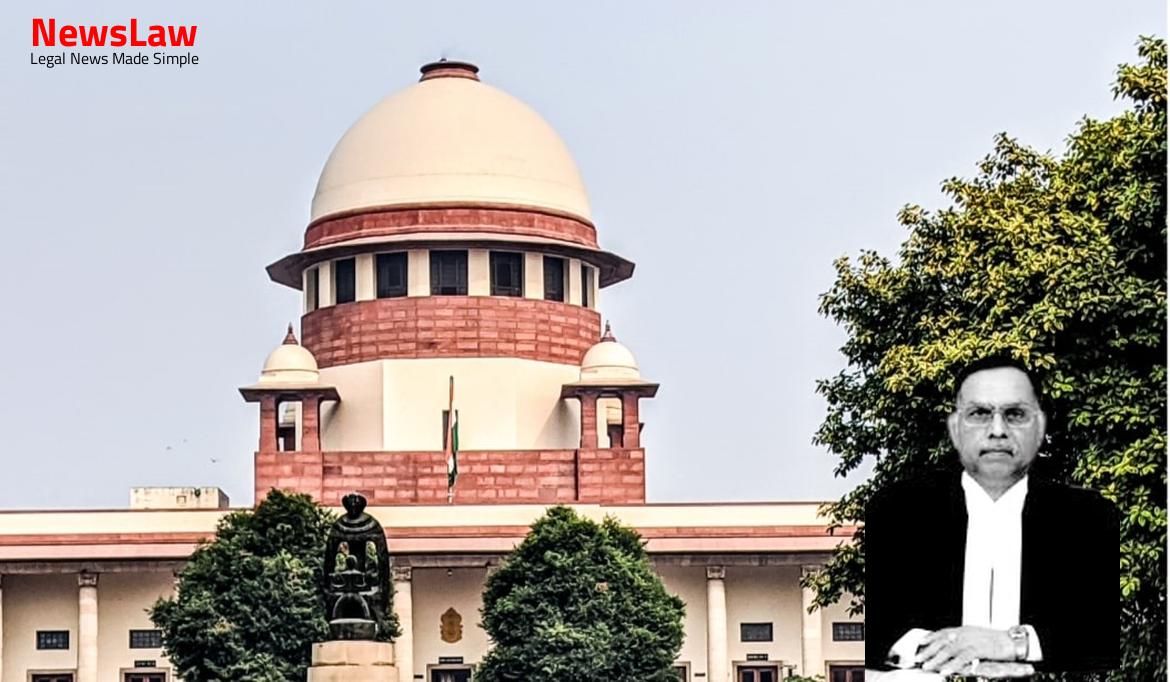Delve into the intricate legal analysis conducted by the court regarding the jurisdiction in insolvency and winding up proceedings. The complexities of various statutes and the prevailing nature of the IBC over traditional winding up processes are at the forefront of this case. The court’s examination of these matters offers valuable insights into the legal landscape surrounding corporate restructuring and financial matters.
Facts
- Indiabulls Housing Finance Ltd. filed a petition under Section 7 of the Insolvency and Bankruptcy Code, 2016, which was dismissed by the NCLT and NCLAT.
- A Civil Appeal from the NCLAT order was admitted by the Supreme Court, which is pending.
- An application by Indiabulls to hand over possession of mortgaged property was granted in their favor.
- Ex-Directors of SRUIL challenged the sale unsuccessfully in Debt Recovery Tribunal and Debt Recovery Appellate Tribunal.
- SREI Equipment Finance Limited filed a petition under Section 7 of IBC, which was admitted by the NCLT in 2019.
- The NCLAT corrected an order in 2020 related to the sale of the mortgaged property.
- Action Barter sold mortgaged property for INR 705 crore and the provisional liquidator handed over the possession to Indiabulls.
- A settlement between Action Barter and Honest Shelters led to withdrawal of appeal by Action Barter.
- Three sale certificates were issued to Honest Shelters on receiving payment of INR 705 crore.
- A winding up petition by Action Barter against SRUIL was admitted due to non-compliance with deposit requirement.
- Execution application by the Appellant before the Bombay High Court is pending.
- SRUIL filed an appeal against an order, which was dismissed by the Division Bench of the High Court on 17.01.2017.
- Action Barter’s appeal against the same order was allowed, and SRUIL was directed to deposit INR 18 crore.
- SRUIL had to deposit INR 3 crore immediately and the remaining INR 15 crore within six months.
- The Division Bench had earlier directed SRUIL to deposit INR 14 crore or provide a bank guarantee, which resulted in a stay order.
- The winding-up petition of SRUIL is pending before the Bombay High Court.
Also Read: Limitation Period in Arbitration Disputes: Court’s Legal Analysis
Arguments
- Post admission of a winding up petition, no petition under Section 7 of the IBC can be filed.
- Sections 391 to 393 of the Companies Act, 1956 would apply if the company were to be restructured.
- Effect of Section 446 of the Companies Act, 1956 is that no suit or legal proceeding can be initiated post admission of winding up petition.
- The only route available for SREI was to ask for transfer of the company petition in winding up to NCLT.
- Petition filed under Section 7 of the IBC was seen as suppressing the winding up proceeding.
- Arguments presented by learned counsel regarding the independence of a Section 7 proceeding under the IBC and the malafides in the present case.
- Reference to the irreversible steps taken in the winding up petition admitted by the Bombay High Court.
- Argued that no irretrievable steps have been taken in the winding up proceeding as the provisional liquidator is still handling other assets of SRUIL.
- Claimed that a private sale by a secured creditor outside the winding up is not the irretrievable step mentioned in Action Ispat.
- Stated that the provisional liquidator must take the irretrievable step himself in selling the company’s assets during winding up.
- Pointed out that two orders dated 28.11.2019 and 20.01.2020 by the Bombay High Court directed the provisional liquidator to hand over assets to the interim resolution professional appointed in the Section 7 proceeding.
- Noted that the assets were not handed over as certain payments by the IRP to the provisional liquidator were still pending.
Also Read: Interpretation of Royalty in Software Import Case
Analysis
- The Tribunal retains the power to control winding up proceedings even after admission.
- Proceedings can continue in parallel under multiple statutes before admission of winding up petition.
- Company Court has discretion to transfer winding up petition to NCLT even post-admission.
- Winding up transfer to NCLT depends on irreversible stage of corporate death.
- Transfer rules, 2016 allow for shifting winding up proceedings to NCLT at specified stages.
- Section 238 of the Code gives precedence to its provisions over other laws.
- NCLT correctly applied Section 238 to independent proceedings by secured financial creditor.
- Any suppression of winding up proceeding doesn’t affect independent proceedings.
- Section 41 of the Securitisation and Reconstruction Act makes amendments in specified Acts only, excluding the Sick Industrial Companies Act.
- The SFC Act cannot override the provisions of Sections 529(1) and 529-A of the Companies Act, 1956.
- The IBC is a special statute focused on ensuring the revival and continuation of the corporate debtor.
- The IBC prevails over winding up proceedings under the Companies Act.
- Section 238 of the IBC gives it overriding effect in case of conflict with other statutes.
- Proceedings under the Recovery of Debts Due to Banks and Financial Institutions Act or the SFC Act must be consistent with the Companies Act.
- Special laws like the IBC or the RDB Act prevail over general statutes like the Companies Act.
- In case of conflict between two special laws, the later Act will normally prevail.
- The proceedings under Section 29 of the SFC Act prevail over winding-up proceedings before a Company Judge.
- The IBC deals with revival of companies and views winding up as a last resort.
- A choice is available under Section 434(1)(c) of the Companies Act for the transfer of winding up proceedings to the NCLT.
- Section 230(1) of the Companies Act, 2013 allows for compromises or arrangements between a company and its creditors or members.
- The Tribunal can order a meeting of creditors or members as necessary for such compromises or arrangements.
- Arrangements under this section may include reorganizing the company’s share capital.
- Under the Companies Act, winding up can be ordered, whereas under the IBC, the focus is on corporate debtor revival.
- Secured creditors can realize their security outside of winding up proceedings.
- Discretionary jurisdiction under the fifth proviso to Section 434(1)(c) of the Companies Act, 2013 does not supersede the jurisdiction of the NCLT under the IBC once the conditions of Section 7 and other IBC provisions are satisfied.
- Section 7 of the IBC is an independent proceeding that is separate from other provisions, thus not constituting any subterfuge.
- The NCLT’s jurisdiction under the IBC takes precedence over discretionary jurisdiction under the Companies Act, 2013.
Also Read: Interpretation of Section 43B: Debentures vs. Interest Payment
Decision
- The appeal has been dismissed based on the reasons provided.
- The interim order passed by the Court on 18.12.2020 will be immediately vacated.
Case Title: A. NAVINCHANDRA STEELS PVT. LTD. Vs. SREI EQUIPMENT FINANCE LIMITED (2021 INSC 128)
Case Number: C.A. No.-004230-004234 / 2020



